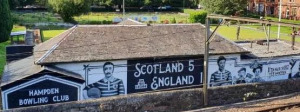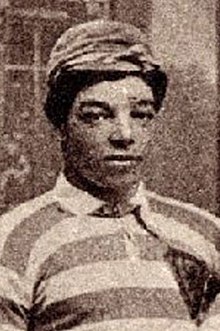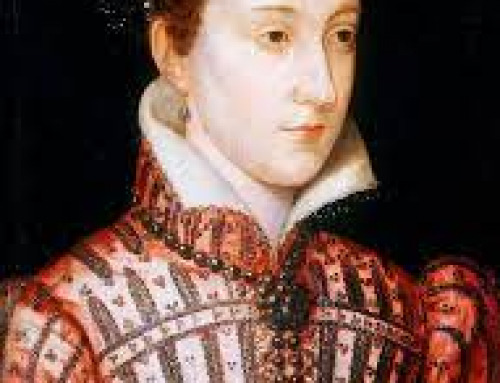Andrew was born in Georgetown, Demerara, the capital of British Guyana to a wealthy Scottish sugar plantation owner, Peter Miller Watson, and a local black Guyanese woman called Hannah Rose. He also had an older sister called Annetta. Their father Peter Watson was born at Kiltearn, near Dingwall in 1805 to James Watson and his wife Christian Robertson of Kiltearn. At the age of 4, Andrew Watson, along with his sister Annetta, accompanied their father on a voyage across the Atlantic Ocean for a new life in Britain, leaving their mother behind in Guyana.
After arriving in Britain, Andrew Watson benefitted from the English public school system. At the time of the 1861 Census, Andrew was 4 years old and attending a school in Staffordshire followed by schools in Yorkshire and Wimbledon. Whilst Andrew’s father clearly had the means and desire to offer his children an expensive education, Andrew’s status as the offspring of an unmarried black mother and a white father was problematic and Andrew was presented to the schools he attended as an orphan. The timing of the move was significant; the importance of team sports was being acknowledged by leading English schools and none were more popular than the emerging sport of Football. It is likely that a young Andrew was first exposed to football during his education.
In 1869, Watson’s father died, leaving an estate worth in excess of £35,000 (in today’s money this equates to more than £3 million pounds) shared between Watson, then aged 13, and his sister Annetta (a small amount was also left to their mother in Guyana). Due to his father’s death, Watson became financially independent for life and was able to devote a significant amount of time to football, an advantageous situation given that Scottish football was wholly amateur until 1893.
At the age of 19, Watson enrolled at the University of Glasgow to study engineering, natural philosophy and mathematics. Thanks to his inheritance, he could afford to be taught by the best academics the institution had to offer, including Lord Kelvin. However, Watson did not complete his studies, and by 1877, as a man of independent means he set up a wholesale warehouse business Watson, Miller & Baird in Glasgow. In November that same year, his business partner, William Govan Miller was a witness at his marriage to Jessie Nimmo Armour of Govan.The marriage certificate records Watson’s profession as an ‘apprentice mechanical engineer’, a line of work he pursued throughout his life alongside football. He went on to specialise in marine engineering and was employed as a crew member of various ships crossing the Atlantic between British ports and North America.
In 1878, a son, Rupert Andrew Watson was born and in 1880 a daughter, Agnes Maud followed. The young family are in the 1881 census, at 15 Afton Crescent, Govan, with Andrew Watson, head of the household noted as having an occupation of ‘Warehouseman,
From the mid-1870s onwards, Watson combined his dry goods business with a glittering football career. In 1874 he signed for the Glasgow-based Maxwell before moving to the Govan-based Parkgrove FC where he was also, match secretary. Watson acquired a reputation as one of the most stylish, pacey and composed full backs in the Scottish game. Watson was not only the first person of colour to play football in Britain but also to hold an administrative role within a British team. Watson’s position as a local business owner and a gentleman enabled him to hold the responsible and prestigious position of match secretary within the team. 1880 saw Watson invited to join the leading Scottish club of the era Queen’s Park, where he also fulfilled the role of match secretary. Not only was Queen’s Park one of the most successful clubs, but it also had a reputation as being the club of choice for the social elite. That Watson held the position of secretary is a strong indicator of his social status in Scottish society.
Watson also won three international caps when playing for Scotland his first cap came against The Auld Enemy, England in London on 12 March 1881, in which he captained the side. Scotland won 6–1, which is still a record home defeat for England. A few days later, Scotland played Wales and won 5–1, Watson captaining Scotland again.
Watson’s last cap came against England in Glasgow on 11 March 1882. This was a 5–1 victory again to Scotland. Watson moved to London in the summer of 1882, which effectively ended his international career as the SFA only picked players based in Scotland at this time.
The next non-white person to receive a full international cap for Scotland was Paul Wilson in 1975. The next black person selected to play for Scotland after Andrew Watson was Nigel Quashie in 2004, 120 years later.
His success in these international matches brought Watson to the attention of leading figures in English football and a move to English football followed, initially with the Slough-based Swifts FC. Among Watson’s many admirers was Nicholas Lane Jackson, a committee member of the Football Association and founding member of the Lawn Tennis Association. Jackson went on to form the prestigious amateur Corinthian FC, whose short passing games and organised interplay had been modelled on Watson’s Scotland team. Watson himself would later turn out for the Corinthians alongside his playing duties for Swifts. It is striking that Watson appears to have moved within the highest echelons of the footballing establishment in both England and Scotland, playing and serving in administrative roles at some of the most prestigious amateur clubs both North and South of the border. It is noteworthy that Watson’s ethnicity never featured in match reports and there is no evidence of him being subject to racial discrimination from crowds. It would appear that Watson’s, public school education, wealth and status as the son of a gentleman seemed to have protected him from the racist attitudes of later nineteenth-century society.
Despite his successes in London, his home life would be marked by tragedy. Andrew’s wife Jessie, died late in 1882, prompting a return to Glasgow along with his two young children. Andrew and Jessie’s children were cared for by his wife’s family and over the next few years, Andrew divided his time between Glasgow and London, playing for Queen’s Park, Swifts and touring with the Corinthians. As he no longer resided full-time in Scotland, he was not eligible to play for the international side again, curtailing what would have likely been a lengthy and successful international career. Nevertheless, Andrew Watson won further Scottish cups with Queen’s Park in 1886 and 1887. In 1887, Watson also remarried. Five years after the death of his first wife, Watson married Hampshire-born Eliza Kate Tyler in 1887 in Glasgow. Watson’s sister, Annetta was a witness at the ceremony in Florence Street.
After his second marriage, Watson moved to Liverpool and went on to play for Bootle FC. Bootle paid wages to some of their players and whilst there is no evidence that Watson received financial compensation from the team, it is possible that he may have been the world’s first Black professional footballer. In Liverpool, the couple had a son, Henry, in 1888, and a daughter, Phyllis in 1891. The port became a useful base for his career in maritime engineering; he was listed as a crew member on many ships leaving Liverpool for the Americas and became a qualified maritime engineer. In retirement, Watson returned to London, dying at 88 Forest Road, Kew in 1921 at the age of 64, with his death going largely unnoticed by the football world.
Watson’s pioneering career was overlooked for many years, and how he spent his later years has only recently come to light. Thanks to diligent research work in archives across the country, such as the NRS, it has been possible to appreciate the nature and scale of his contribution to the sport and tell his life story. There is much more to discover about this remarkable man, who in the 1880s achieved so much, including being the first black captain of an international team, the first player of colour to win a major footballing competition and the first black player to appear in the English FA Cup. The list of footballing ‘firsts’ makes Andrew Watson one of the most significant figures, not only in the Scottish game but in world football. A status that was acknowledged by the Scottish Football Association when they inducted him into the Scottish Football Hall of Fame in 2012. A mural of Watson was painted on the side of Jodandys cafe in Shawlands south Glasgow in 2020, and he also features prominently in the First Hampden Mural at Hampden Bowling Club
He is buried in Richmond Cemetery, and for most of the 20th Century he was forgotten but in 2013 his grave was finally identified by Andy Mitchell however a Scotland fan who lives in the area visited the cemetery in 2020 and took pictures of the grave displayed on this site. It struck the Scotland fan, known as Ally, that this was all rather sad – one of Scotland’s most important sporting icons, who is commemorated on a mural at Hampden, who will hopefully be recognised with a permanent statue/memorial in Glasgow and who should be lauded as a pioneer of the game of football, in an unassuming resting place with no indication as to his importance. Surely the very least that should be done is that the grave could be tidied up and restored to a more befitting state, so the London Tartan Army better known as loonyalba kicked off donations with an initial £250 contribution, and a crowdfunding page to pay for restorations
On the 24th of April 2021, the restored grave of Andrew Watson (24 May 1856 – 8 March 1921) was unveiled with a commemoration ceremony. It marked 100 years since Andrew passed. Several members of Loonyalba were in attendance and the club laid a wreath to commemorate this remarkable man who won three Scottish Cups and four Glasgow Charity Cups with Queen’s Park and played in the Corinthians side which thrashed FA Cup holders Blackburn Rovers 8-1 in 1883. Swifts in 1882, he also has the accolade of being the first black footballer to play in the FA Cup, and 3 Caps for Scotland.
Arthur Wharton was previously commonly thought to be the first black player, as he was the first black professional footballer to play in the Football League but Watson’s career predated him by over a decade. There is evidence that Watson was paid professionally when at Bootle in 1887, two years prior to Wharton becoming a professional with Rotherham Town, however, the Merseyside club did not play in the Football League at the time Watson played there.






Leave A Comment